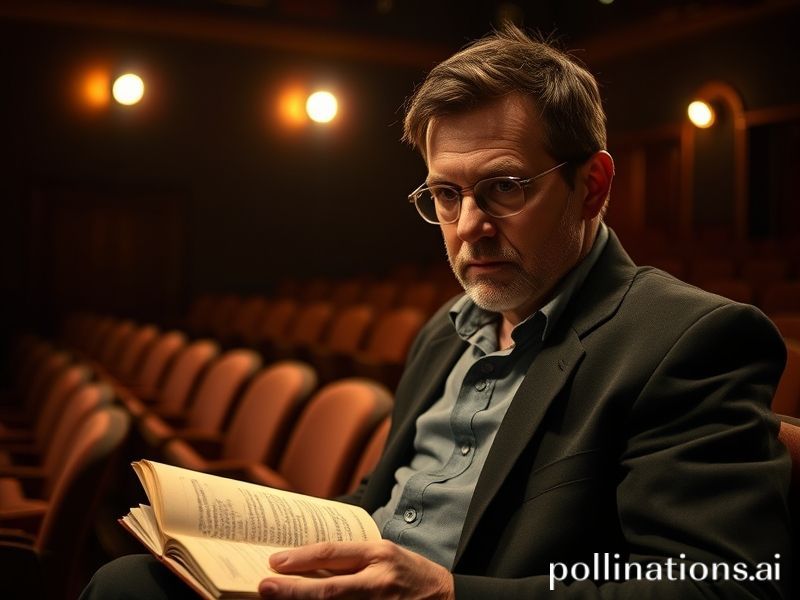Exporting Anguish: How Jack Thorne Became the World’s Therapist-in-Chief
Jack Thorne, the British playwright-screenwriter who once cheerfully admitted he can’t write a happy ending without feeling like he’s selling snake-oil, has quietly become the unofficial dramatist of our planetary nervous breakdown. From the neon-lit council estates of “This Is England ’90” to the snow-blind trauma of “His Dark Materials,” Thorne has exported a particularly British brand of bleak hope to 190 countries, proving that misery, like oil tankers and crypto scams, travels remarkably well.
To the average Netflix-scrolling citizen in São Paulo or Seoul, Thorne’s name is buried somewhere between the subtitles and the skip-intro button. Yet the emotional fallout of his scripts is doing more for global empathy than any UNESCO brochure. When he turned the French film “The Intouchables” into the American smoothie “The Upside” (Bryan Cranston and Kevin Hart swapping quadriplegic wisecracks), critics called it cultural vandalism. Still, the film grossed $125 million worldwide, demonstrating that even palliative sentimentality can be a growth market—especially if you keep the disabled protagonist just winsome enough to secure Gulf-state distribution rights.
Meanwhile, in the colder corners of Europe, Thorne’s stage adaptation of “A Christmas Carol” has become a Yuletide cash cow from Reykjavik to Rome. Each year, new Scrooges stagger under Jacob Marley’s chains, their LED-lit despair twinkling like a Bloomberg terminal at midnight. Audiences exit clutching mulled wine and the fleeting sensation that late-stage capitalism can still be redeemed by a single act of charity—or at least a generous tax write-off.
The United Nations could learn a trick or two. When UNICEF asked Thorne to consult on the refugee-themed virtual-reality project “Gabo,” the brief was to “make the viewer cry in under four minutes.” He delivered in three and a half. Tech blogs praised the “immersive pathos,” while a Greek border guard reportedly took off his headset and muttered, “Great, now even guilt comes in 4K.” The experience was later screened at Davos between panels on blockchain for good, allowing CEOs to sample humanitarian heartbreak without the inconvenience of an actual camp visit.
But Thorne’s real geopolitical coup is subtler: he has weaponised nostalgia for progressive purposes. In “Enola Holmes,” he recasts Sherlock’s baby sister as a proto-feminist supersleuth, peddling 19th-century girl power to markets where 21st-century women still need a court order to leave the house. Turkish censors trimmed a line about corsets, while the Saudi release added a disclaimer that “historical depictions of female agency do not constitute legal precedent.” Everyone wins: Netflix racks up subscribers, local authorities save face, and teenage viewers learn that resistance can be monetised if you keep the running time under two hours.
All of this leaves Thorne himself in the faintly ridiculous position of being the world’s highest-paid barometer of collective guilt. Interviewed on a Melbourne stage last month, he confessed that his therapist once asked whether he writes sad stories because he’s depressed, or if the globe is simply auditioning for one long Thorne monologue. The audience laughed—then caught itself, unsure if sympathy was still tax-deductible.
So what does it mean when one man’s diary of national decline becomes a universal export? Perhaps that anguish scales better than joy, that subtitles forgive accent, and that, in the great bazaar of streaming content, despair is the last reliable commodity not subject to tariffs. Or perhaps it’s simpler: we all enjoy a good wallow, as long as the Wi-Fi holds and the next episode auto-loads before we have to face the silence of our own living rooms.
Either way, Thorne keeps typing. Somewhere in London, another broken family is assembling itself into a three-act structure, ready to be beamed to a flatscreen in Lagos or Lima. The world will watch, tissues in one hand, phone in the other, comforted by the knowledge that someone, somewhere, is having a worse evening—brought to you in crisp 5.1 surround sound.







